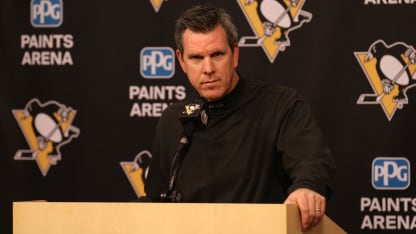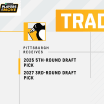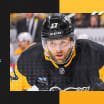Sullivan on extension, lessons learned and motivation

Everyone knows the story now, but Sullivan was hired at the start of last season to be the team's head coach in Wilkes-Barre/Scranton. He was promoted to Pittsburgh on Dec. 12, 2015 and steered one of the most remarkable stories in NHL history, taking over a struggling and mentally fragile team and transforming them into a fast, resilient Stanley Cup champion.
I spoke with Mike Sullivan on the phone. We talked about his contract extension, the lessons he's learned in the past year and his motivation to repeat as champions.
Thank you coach for taking the time to speak with me. And I guess we can start by saying congratulations on the contract extension. It's certainly well deserved.
Well thank you. I'm excited. It's nice to have some assurance and certainty. To be a part of the Penguins for me has been a privilege. It's a great organization to work for.
How did the deal come together? And how long did the process take?
It was very smooth. It's been going on for a few weeks. It's not been on the front burner. This is something that's been discussed behind the scenes. Our first priority is trying to win hockey games. That's been our first order of business. For Jim (Rutherford) to make it a priority means a lot to me, and David Morehouse as well. For them to show a vote of confidence in me and our coaching staff the way they have is rewarding from my standpoint. I'm grateful for the opportunity that I have here to coach this team. I think the Pittsburgh Penguins organization is a first-class organization. I'm honored to be a part of it.
You said the Penguins are a first-class organization. What is it about this organization that makes it first class, and why do you want to be a part of it for the next three years?
I think they do things the right way. The way they treat people. The organization and how they utilize people to maximize the resources that we have to give this team the best chance to win is exciting to be a part of. I think of that saying, 'To whom much is given much is expected in return.' We have very high expectations as an organization. That's always exciting to be a part of as an athlete or coaches because the reason we're in it is because we want to win championships. When you look at how this organization has been run over the years, they do things the right way that give this team the best chance to compete for a championship year in and year out. They have a great scouting staff. They have a great development department. They make a huge investment in Wilkes-Barre and the minor-league team as part of that development process. They do everything within their power to give the organization a chance to compete for championships. To be a part of that is exciting. I'm very grateful for the opportunity that I've been given here, and I look forward to the challenges ahead.
At this time last year you were three weeks into taking over the club in Pittsburgh. It was your first experience coaching Sidney Crosby, Evgeni Malkin, Kris Letang and the group. What did you learn most about those players as individuals and the team in general?
The thing that jumps out to me the most is the quality of the people, the quality and character of the players. I knew they were good players having coached in this league for a number of years against them, but I never knew them personally and what they stand for, how they approach the game. What I've come to learn about this group of players over the last year, and the Stanley Cup is probably the pinnacle, is the character that it takes to win and the challenges that you have to overcome as a group, the selfless approach that these guys have taken to try to win as a team. I think that separates them from others. I can't say enough about the character and the leadership of this group of players that we have. It certainly is a privilege to be their coach.
We've talked before about coaching having to constantly evolve and re-evaluate themselves. What did this past year teach you about yourself and how has it changed you personally?
You strive your whole life to win championships. The ultimate championship is the Stanley Cup. It might be the hardest championship in all of sports to win. Anytime you go through an experience like that you learn a lot about yourself and about the people around you. You feel sometimes as though you have what it takes to get the job done. Until you actually go through it and get it done, you don't know for sure. We all find a level of personal satisfaction in knowing that we've made the ultimate commitment and sacrifices to try to win the Stanley Cup. For me it ranks at the top of my list as one of the most rewarding, fulfilling experiences of my lifetime.
A common catchphrase of yours is "Just play." In fact, the team adopted the mantra throughout the course of last season. Did that saying kind of grow organically, or was it something you intended to drill into the players' heads?
We talked a lot about resilience. We talked about a certain resolve when adversity hits us either through the course of a 60-minute hockey game or through the course of an 82-game schedule. What's important is how we react to the adversities that come our way. Inevitably they're going to happen. They occur with every team in the league. From my experience from being around this game is the teams that have success or the players that have success down to a man are the people that learn how to respond and react the right way. We talked about that almost daily with our players, and we continue to talk about it. The way it evolved with some of the vocabulary that I used was let's just play. We can't control certain things that go on out there that maybe don't go our way. We've got to react the right way. Let's just drop the puck, line up and play. If we have that mentality, if we have that mindset, if we have that certain resolve amongst our group then we have what it takes to overcome these challenges.
Early on when you took over the team and they struggled, you said that you tried to maintain a certain resolve yourself despite the setbacks in the hopes that it would filter down to the players. Do you believe that players tend to take on the personality of their head coach?
I think anytime you take on a leadership role, regardless of what it is, as a head coach by the nature of that position you are cast in a leadership role, talk is easy. It's through your living, breathing example that's most powerful. So whatever the message that leaders preach they certainly have to walk the walk. I felt strongly that I had to do the same. Our coaching staff had to resemble a certain level of resilience, at least exemplify a certain level of resilience so that our players could take the right cues off of us. I think the same way with the leadership in our room. Sid and Geno, Chris Kunitz and Matt Cullen, Patric Hornqvist, players of that nature, the veterans in the room that this team looks upon during the tough, trying times, they have to lead by the same example. And they have. That's what makes me so proud of these guys and this group, is how well they have responded to the challenges that this team has faced. I said on a number of occasions last year, I don't know that there was another team in the league that went through more adversity than this Pittsburgh Penguins team. We've faced some challenges this year as well. What I've grown to love about this group is the resilience that they show. They continue to do it to this day. For me as their coach, we're certainly proud of them. We look towards these guys as inspiration to continue moving forward. They're a privilege to coach. We push them hard because we believe in them and we think they're capable of great things. But we certainly have a great appreciation for their commitment level, and their try.
You said that winning the Stanley Cup is the pinnacle of your career. That being said, having achieved that goal, what is it that motivates you to continue striving for another championship? What is your inner drive?
We're all in this to pursue excellence, to win a championship. I don't think you ever arrive as a professional athlete, or a team, or a coach. We all have opportunities to grow and develop and get better. This is a new season with a whole new set of challenges. We have a similar team in the sense that the personnel is very similar. But we're a new team because it's a new season and there are new challenges. It's another great opportunity to compete and try to win. I think that's why we're in it. I think that's what drives all of us when we get up and go to the rink everyday. I'm no different. I'm as hungry today as I was 10 years ago to try to win championships, to try to excel and try to be the best at what we do. I think that's what drives each and everyone of us everyday.


















































